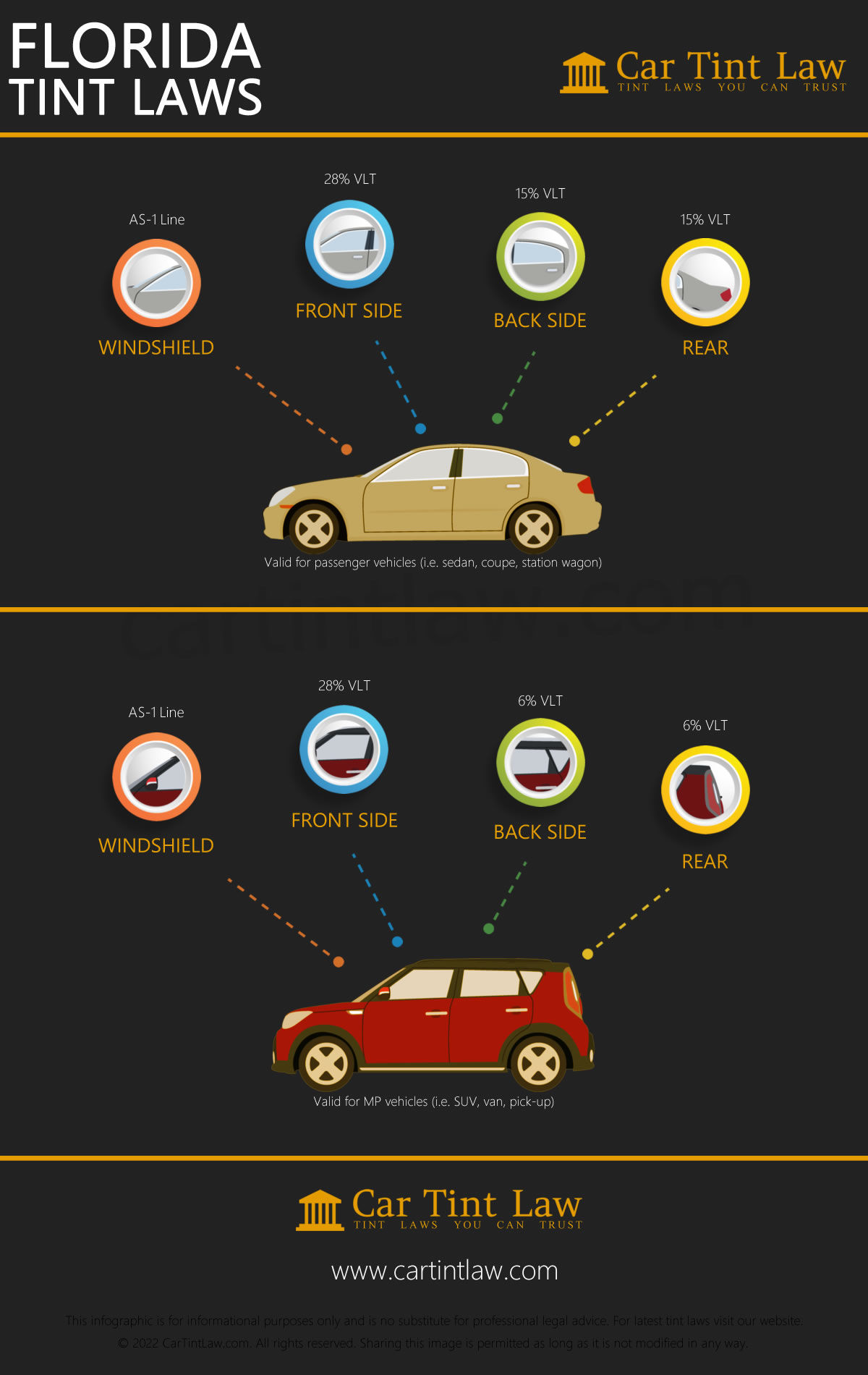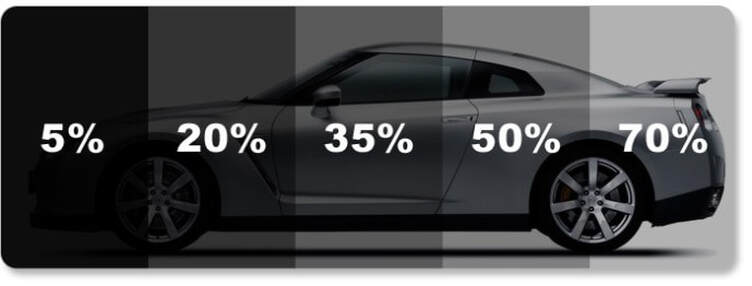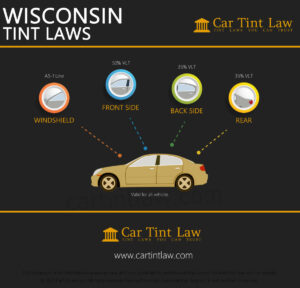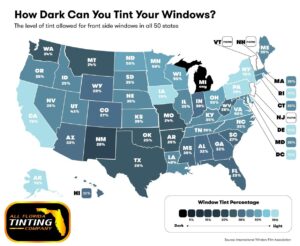As an Amazon Associate, I earn from qualifying purchases
Understanding Florida car window tint law is crucial for drivers. It helps avoid fines and legal issues.
Florida’s sunny climate makes window tinting popular. It offers comfort and protection from harmful UV rays. However, there are regulations to follow. Florida law sets specific limits on how dark or reflective your car windows can be. Ignoring these rules can lead to fines or failed inspections.
Knowing the legal limits helps you stay compliant. This guide will explore the key aspects of Florida’s car window tint law. We’ll cover the rules for different types of vehicles and windows. Staying informed ensures you enjoy the benefits of tinted windows without any legal trouble. Let’s dive into the details of Florida’s window tint regulations.

Credit: thetintlaws.com
Introduction To Florida Tint Law
Understanding the Florida Car Window Tint Law is important for drivers. Each state has its own rules about window tinting. Florida is no different. Knowing these laws can help avoid fines. It also ensures your car is legally compliant. Let’s dive into the details of Florida’s tint laws.
What Is Car Window Tint?
Car window tint is a thin film. It is applied to the inside of car windows. This film can be dark or reflective. It helps block sunlight and UV rays. It can also increase privacy. Window tint comes in different levels of darkness.
Importance Of Tint Laws
Tint laws are in place for safety reasons. They ensure drivers can see clearly. These laws also help law enforcement. They need to see inside the car during traffic stops. Tint laws also protect drivers from too much sun exposure. Following these rules is crucial for everyone’s safety.

Credit: www.cartintlaw.com
Legal Tint Limits
When considering window tinting for your car in Florida, knowing the legal limits is crucial. The state has specific guidelines on how dark your car windows can be. These laws are in place to ensure safety and visibility for drivers.
Front Side Windows
The front side windows must allow more than 28% of light in. This means they can be tinted, but only to a certain degree. The tint should not be too dark. This ensures that drivers can see clearly and are visible to others.
Back Side Windows
For the backside windows, the law is slightly different. These windows can have a darker tint. They must allow more than 15% of light in. This provides more privacy for passengers in the back seat.
Rear Window
The rear window follows the same rule as the back side windows. It must also allow more than 15% of light in. This level of tint is sufficient for reducing glare. It also enhances privacy without compromising safety.
Allowed Tint Percentage
Understanding the allowed tint percentage for car windows in Florida is crucial. Different windows have different restrictions. Following the law ensures safe driving and avoids fines.
Visible Light Transmission (VLT)
The Visible Light Transmission (VLT) percentage refers to the amount of light that can pass through your car windows. In Florida, the front side windows must allow at least 28% of light in. Rear side windows and the back window should allow at least 15% of light. This means your windows can be tinted, but they cannot block too much light.
| Window | Allowed VLT Percentage |
|---|---|
| Front Side Windows | 28% |
| Rear Side Windows | 15% |
| Back Window | 15% |
Reflective Tint Restrictions
Reflective tint can help reduce glare and heat. But in Florida, there are limits to how reflective your car windows can be. The front side windows can be up to 25% reflective. The rear side windows can be up to 35% reflective. This helps ensure that your windows are not too shiny and do not cause visibility issues for other drivers.
- Front Side Windows: Up to 25% reflective
- Rear Side Windows: Up to 35% reflective
Exemptions And Special Cases
Understanding Florida’s car window tint laws can be complex. There are specific exemptions and special cases that you should know about. These exceptions cater to unique needs and circumstances.
Medical Exemptions
Some individuals need darker window tints for medical reasons. Conditions like lupus, melanoma, or other skin-related issues may qualify. To get an exemption, a physician must provide a signed statement. This statement should specify the medical need for darker tints.
Once you have the statement, submit it to the Florida Department of Highway Safety and Motor Vehicles. They will review and approve the exemption. This allows darker window tints than the usual legal limit.
Vintage And Classic Cars
Vintage and classic cars often have specific needs. Owners of these cars may seek exemptions from standard tint laws. The primary reason is to preserve the car’s original appearance.
Owners need to provide evidence that their vehicle qualifies as vintage or classic. This usually includes proof of the car’s age and historical significance. Once approved, they can use non-standard tints to maintain the car’s authenticity.
Penalties For Non-compliance
Florida has specific laws regarding car window tinting. Non-compliance with these laws can lead to penalties. These penalties are both financial and procedural. Understanding these penalties is crucial for car owners.
Fines And Fees
Violating Florida’s window tint law can result in fines. First-time offenders may face a fine up to $100. Repeat offenders might see higher fines. Some areas in Florida have stricter enforcement. These areas could impose additional fees.
Removal Requirements
In addition to fines, violators may need to remove the tint. This means taking the car to a professional. The cost of removal can vary. It depends on the extent of the tint. Removal must be done before the car can be legally driven again. Compliance is verified through a follow-up inspection. Failure to remove the tint can lead to more penalties.
Choosing The Right Tint
Choosing the right window tint for your car in Florida can be challenging. The state has specific laws about how dark your tints can be. It’s important to understand these rules to avoid fines and ensure safety. This guide will help you make an informed decision.
Legal Vs. Illegal Tints
Florida’s window tinting laws are quite strict. For the front side windows, the tint must allow more than 28% of light in. The rear side windows can be darker, allowing only 15% of light. The rear window follows the same rule as the rear side windows.
Illegal tints are those that do not meet these requirements. Police officers can easily spot illegal tints, which can lead to fines. Always measure your tint before installation. Use a tint meter to check the percentage of light passing through.
Professional Installation Tips
Getting your car windows tinted by a professional ensures the job is done correctly. Here are some tips:
- Research local tinting services: Read reviews and ask for recommendations.
- Check certifications: Ensure the installer is certified and follows Florida laws.
- Ask about the warranty: A good installer will offer a warranty on their work.
- Inspect the work: After installation, check for bubbles, gaps, or peeling edges.
By following these tips, you can ensure your car window tints are legal, safe, and durable.
Maintaining Your Tinted Windows
Maintaining your tinted windows ensures they last long and look great. Proper care also helps you stay within Florida’s car window tint law. Below are some tips to keep your tinted windows in top shape.
Cleaning Tips
Clean your tinted windows regularly. Use a soft cloth or sponge. Avoid paper towels; they can scratch the tint. Use a mild soap and water solution. Harsh chemicals can damage the tint. Spray the solution on the cloth, not the window. This prevents excess moisture around the edges.
Avoiding Scratches
Scratches make your tint look bad and can lead to peeling. Be gentle when rolling windows up or down. Avoid placing sharp objects near the windows. When cleaning, always use soft materials. Check for any small debris on the windows. Remove it carefully to prevent scratching.
Benefits Of Legal Tint
Tinting your car windows offers multiple benefits. Legal tints in Florida provide comfort, safety, and privacy. Here are the main benefits of legal tint.
Heat Reduction
Legal window tinting significantly reduces the heat inside your car. Florida’s sun can make your car feel like an oven. With proper tinting, you can keep the interior cooler. This not only makes your ride more comfortable but also reduces air conditioning usage. Less AC usage means better fuel efficiency.
Uv Protection
Car window tints block harmful UV rays. Prolonged exposure to UV rays can damage your skin and the car’s interior. Legal tints in Florida can block up to 99% of these harmful rays. This helps protect your skin and prolongs the life of your car’s upholstery. It also prevents fading and cracking of the dashboard.
Enhanced Privacy
Privacy is another major benefit of legal window tinting. Tints make it harder for outsiders to see inside your vehicle. This can deter theft by keeping your belongings out of sight. Enhanced privacy also provides a sense of security when you are inside the car. Legal tints allow you to enjoy these benefits without breaking the law.

Credit: www.windowtintinglargo.com
Frequently Asked Questions
What Is The Legal Tint Limit In Florida?
In Florida, the front side windows must allow over 28% of light in. The rear side windows and back windows must allow over 15% of light in.
Are There Medical Exemptions For Window Tint In Florida?
Yes, Florida allows medical exemptions for individuals with specific medical conditions. A medical exemption certificate must be obtained from the Department of Motor Vehicles.
Can You Get A Ticket For Illegal Window Tint In Florida?
Yes, driving with illegal window tint in Florida can result in a ticket. Fines and penalties can vary by county.
What Are The Penalties For Violating Florida Tint Law?
Violating the Florida tint law can result in non-moving violation fines. Fines generally range from $100 to $200.
Conclusion
Understanding Florida’s car window tint law is essential for compliance. It helps you avoid fines. Ensure your tint follows the legal limits. Stay safe on the road. Proper tint also protects from harmful UV rays. Check your tint regularly. It keeps your vehicle legal and safe.
By following these guidelines, you can enjoy the benefits of tinted windows without any legal issues. Happy driving!
As an Amazon Associate, I earn from qualifying purchases


